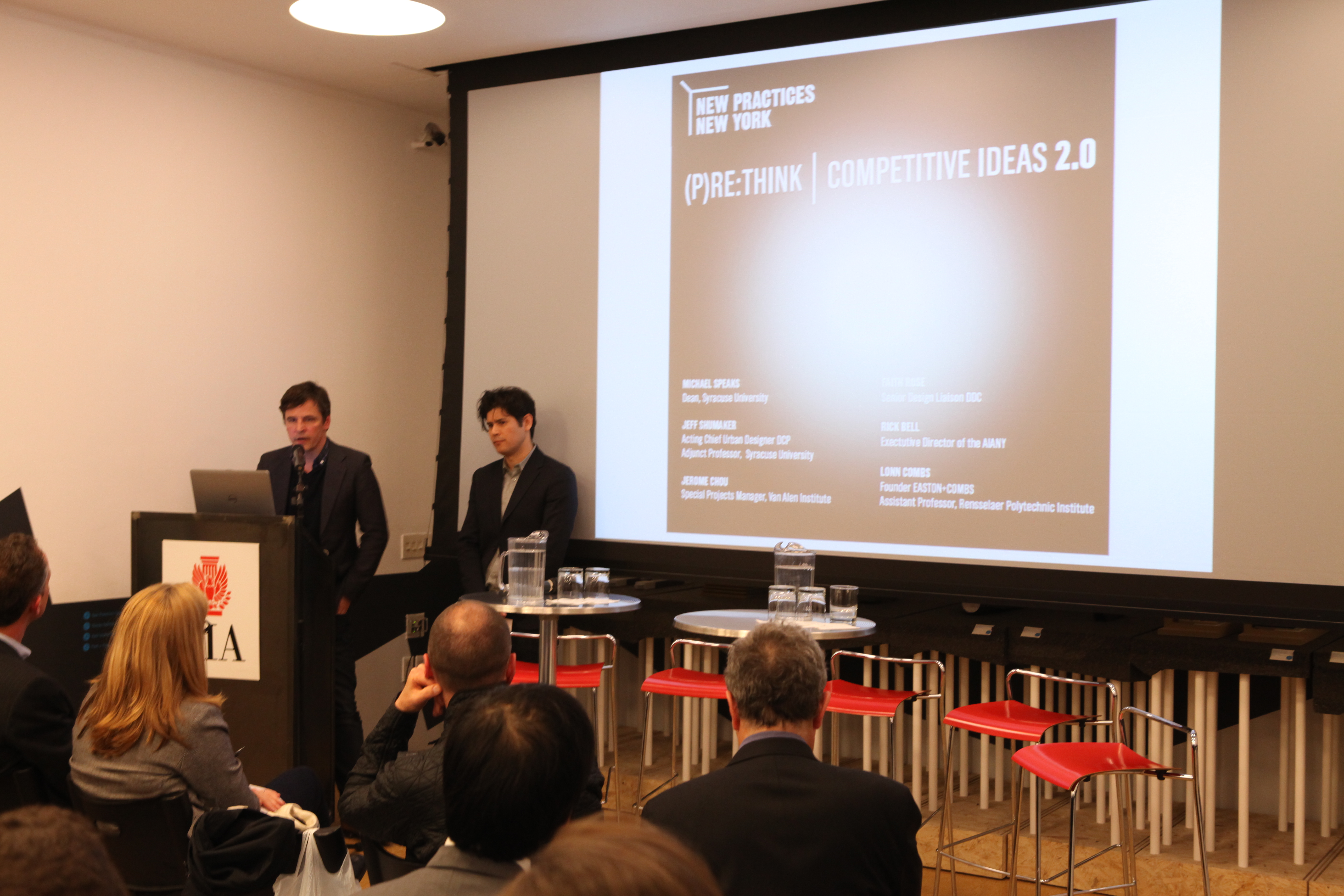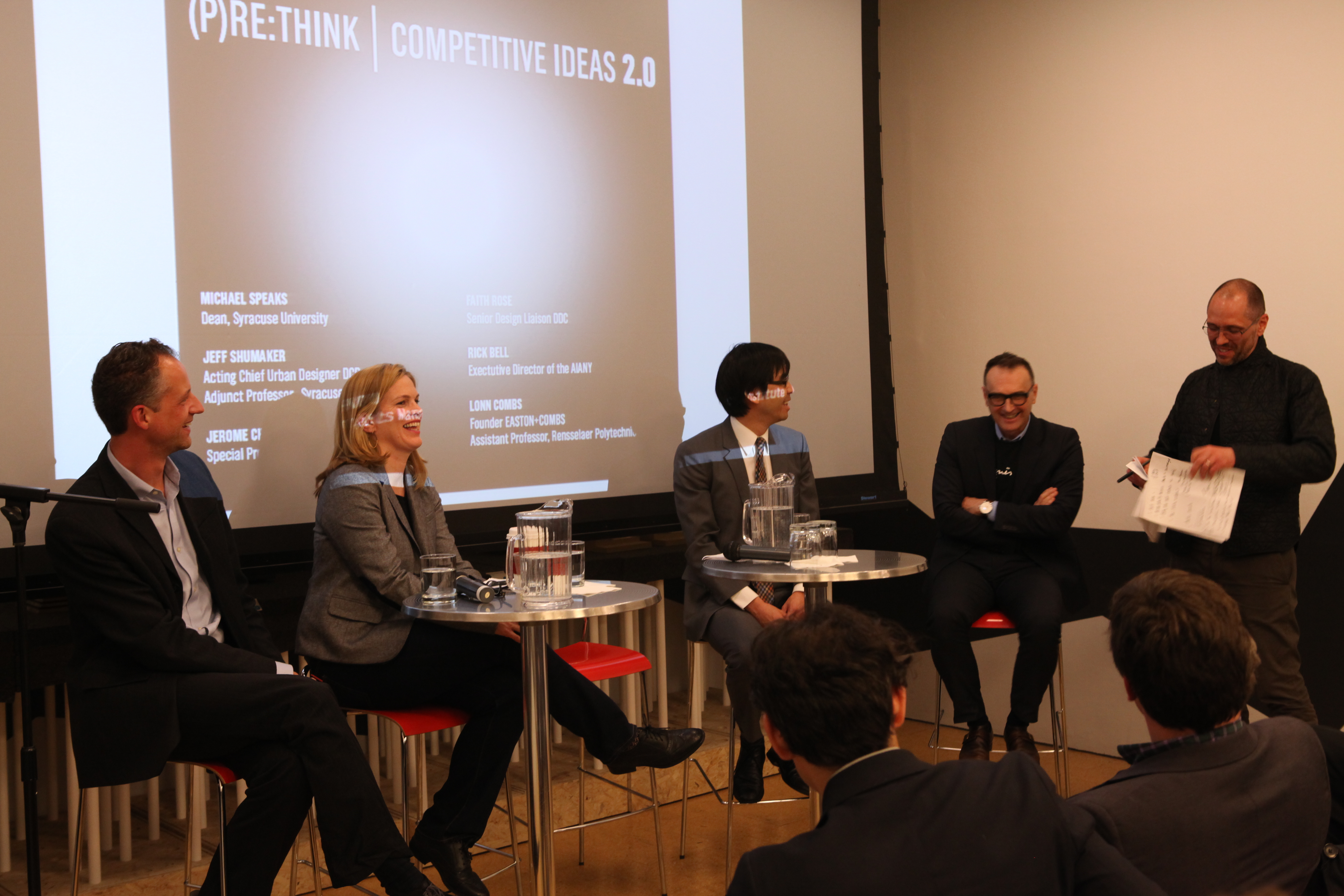by: James Way
The first P(RE)Think panel discussed competitions from the architect’s point of view: portfolio building, exploring ideas, media attention, and that pipedream of winning a commission. Version two-point-oh brought together city agencies, academia, and a cultural institution to examine why clients offer competitions. From theoretical exploration to developers’ bottom lines, competitions can bring together ideas and economy. Introducing the symposium, AIANY Executive Director Rick Bell, FAIA, targeted the ability of competitions to identify the heart of a problem, which could be completely different than first considered, and their ability to “make things happen.”
Jeremy Shumaker, acting chief urban designer at NYC Department of City Planning, encouraged designers to see “what rules can be suspended and whether it has been done before.” More importantly, competitions can uncover the real goals and open projects to a wider talent pool. While New York City does not offer competitions, Faith Rose, senior design liaison at the NYC Department of Design + Construction (DDC), explained that the DDC’s Design Excellence program shortlists a small pool of pre-approved firms to receive RFPs, roughly 50% of which have not worked previously for the city. Rose thinks the resurgence in competitions can bring in better ideas at a lower price for cash-strapped agencies and institutions.
Rose cited that the DDC relies on taxpayers for funds and city agencies for projects. Consequently, the DDC “cannot mistake ideas for reality and that real project competitions cost so much more to ensure they can be built.” Unfortunately, for the past couple of DDC Design Excellence program cycles there haven’t been many funds or projects. There’s even less funding for communities to deal with their problems.
Upping the stakes, Syracuse University School of Architecture Dean Michael Speaks said, “Small and medium-sized cities desperately need design help.” The experienced juror reminded everyone that money and willpower can change the game. This theme was a rallying point for the evening, focusing on Superstorm Sandy and the Rebuild By Design competition, which awards funds to conduct research rather than building, to determine what projects should be investigated. Echoing limited project funding, Jerome Chou, Van Alen Institute’s special projects manager, noted that an increase in the “purse” has promoted design opportunities from spacecraft to urban planning, such as Georgetown University’s Energy Prize for a city to develop a long-term effective energy efficiency plan – “an urban version of ‘The Biggest Loser’.” The prize’s website claims 50 cities have formally expressed interest. While community charrettes identify projects and needs, Speaks is “loathe to crowd-source design – that’s the designer’s job.”
While Chou lamented the lack of feedback competitions offer and Rose cited their effort and expense, Speaks bluntly reminded attendees that they are called competitions for a reason: “They are reflections of what we do every day. You’re naive if you think it’s for young architects to learn something.” Shumaker suggested we should teach design to youngsters because few people are aware of how design adds to quality of life. Speaks added that we cannot expect high design on every block, but architects need to understand value-added design solutions.
James Way, Assoc. AIA, Marketing Manager at Dattner Architects, frequently contributes to eOculus.
Event: (P)RE:Think | Competitive Ideas 2.0
Location: Center for Architecture, 04.30. 14
Speakers: Lonn Combs, Founder, Easton+Combs and Assistant Professor, Rensselaer Polytechnic Institute; Michael Speaks, Dean, Syracuse University School of Architecture; Jeff Shumaker, Acting Chief Urban Designer, NYC Department of City Planning and Adjunct Professor of Urban Design, Syracuse University; Faith Rose, Senior Design Liaison, NYC Department of Design + Construction; and Jerome Chou, Special Projects Manager, Van Alen Institute
Organized by: AIANY New Practices Committee









